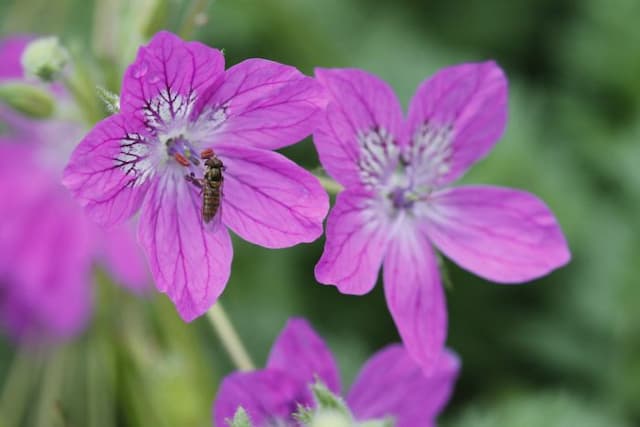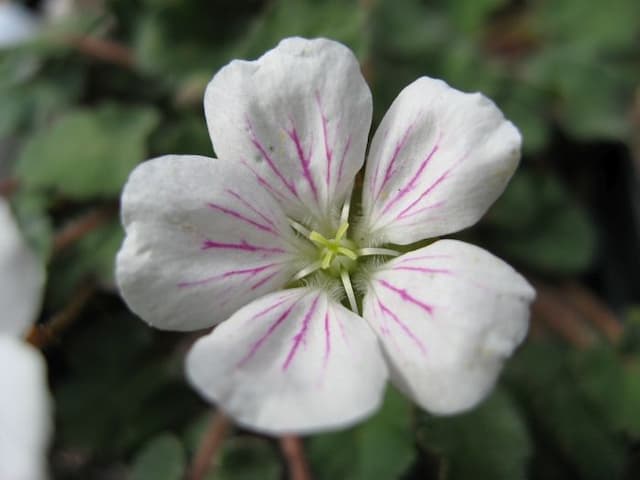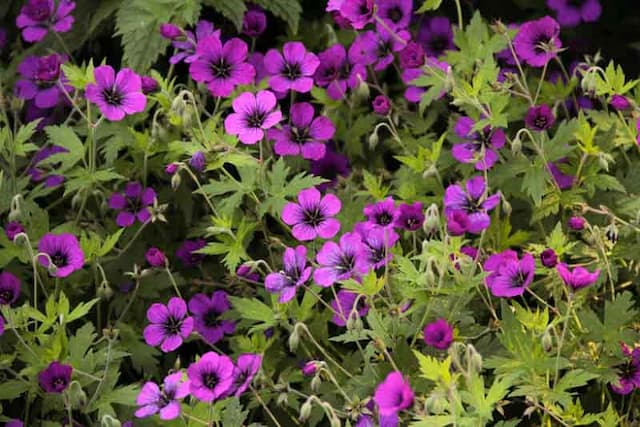Rose Geranium Pelargonium 'Radula' (Sc)

ABOUT
Pelargonium 'Radula', commonly known as scented geranium, boasts a unique and attractive appearance that earns it a favored spot in many gardens. This particular variety is characterized by its deeply cut, lobed leaves that often carry a distinct aroma, which can vary from fruity to spicy depending on the specific type of scented geranium. The foliage typically displays a rich, green hue and can sometimes have a velvety texture, making the leaves as enjoyable to touch as they are to smell. Throughout the blooming season, the scented geranium produces clusters of small flowers which add a splash of color to the plant's lush foliage. The blossoms can come in a range of shades such as pink, purple, or white, depending on the cultivar. Each flower usually has rounded petals that are arranged in a symmetrical pattern, contributing to the plant's ornamental appeal. While the plant's dimensions are not a focus here, it's important to recognize that the scented geranium can adapt to various growing conditions, which can in turn influence its overall shape and structure. It's a versatile choice for both in-ground planting and container gardening, making it accessible to gardeners with varying amounts of space. The plant's robust nature and its ability to emit a pleasant fragrance make it a popular choice for outdoor sitting areas, patios, and as a companion plant in herb gardens.
About this plant
 Names
NamesFamily
Geraniaceae
Synonyms
Rose-scented Pelargonium, Sweet-scented Geranium, Scented-leaf Pelargonium
Common names
Geranium radula, Pelargonium radula
 Toxicity
ToxicityTo humans
Pelargonium 'Radula' is commonly known as the rose-scented geranium. Generally, this plant is not considered toxic to humans. However, ingesting large quantities could potentially cause mild irritation or an allergic reaction in some individuals, depending on their sensitivity. Typical symptoms might include gastrointestinal upset such as nausea or diarrhea. In most cases, exposure to rose-scented geranium is not associated with serious health consequences for humans.
To pets
The rose-scented geranium is not considered highly toxic to pets, but it can cause mild discomfort if ingested. Pets that consume this plant might show symptoms such as vomiting, diarrhea, or drooling. Some pets could also have an allergic reaction. While it is not typically life-threatening, if you suspect your pet has ingested a significant amount of rose-scented geranium, it is still wise to consult a veterinarian for guidance.
 Characteristics
CharacteristicsLife cycle
Perennials
Foliage type
Evergreen
Color of leaves
Green
Flower color
Varies
Height
2 feet (0.61 meters)
Spread
2 feet (0.61 meters)
Plant type
Herb
Hardiness zones
10
Native area
South Africa
Benefits
 General Benefits
General Benefits- Aesthetic Appeal: Pelargonium 'Radula', commonly known as rose-scented geranium, adds beauty to gardens and homes with its delicate blooms and attractive foliage.
- Fragrance: It emits a pleasant rose-like fragrance that can naturally freshen up the surrounding environment.
- Insect Repellent: The essential oils in rose-scented geranium can deter certain insects, making it a natural pest control for gardens.
- Culinary Use: Its leaves are often used to flavor desserts, jellies, and teas, providing a subtle rose essence.
- Drought Resistance: Rose-scented geraniums are drought-tolerant, making them suitable for xeriscaping and low-water gardens.
- Easy Propagation: They can be easily propagated from cuttings, allowing gardeners to expand their collection or share with others.
- Adaptability: This plant can thrive in a variety of conditions, both in outdoor gardens and as a potted houseplant.
- Low Maintenance: They require minimal care compared to many other plants, making them ideal for novice gardeners.
 Medical Properties
Medical Properties- Antibacterial: Pelargonium 'Radula' exhibits antibacterial properties, potentially inhibiting the growth of certain bacteria.
- Antifungal: Similar to its antibacterial properties, it may prevent the growth of certain fungi.
- Anti-inflammatory: Compounds within the plant might be used to reduce inflammation.
- Expectorant: Traditionally, it has been used to help relieve chest congestion and coughs.
- Immune Support: Some claim it can aid in bolstering the immune system.
 Air-purifying Qualities
Air-purifying QualitiesThis plant is not specifically known for air purifying qualities.
 Other Uses
Other Uses- Pelargonium 'Radula', commonly known as rose-scented geranium, can be used in potpourri for its aromatic leaves, adding a pleasant fragrance to a room.
- The leaves of the rose-scented geranium can be infused in sugar, imparting a subtle rose flavor which can be used in baking and dessert making.
- Fresh leaves can be placed in drawers or closets as a natural moth repellent and to impart a fresh scent to linens and clothing.
- Essential oil derived from the rose-scented geranium can be used in homemade candles and soaps for its fragrance and therapeutic properties.
- The plant can serve as a companion plant in the garden to help repel pests from other plants, due to its strong scent.
- Rose-scented geranium leaves can be used to flavor teas or cold drinks, providing a unique floral note.
- When used in a bath soak, the leaves can create a soothing, aromatically relaxing experience.
- Its leaves can also be used to create naturally scented inks for art projects or calligraphy purposes.
- The dried leaves of the rose-scented geranium can be used as a natural filler for sachets and scented pillows.
- Culinary use includes adding finely chopped leaves to jellies, jams, and ice creams for an exotic, floral flavor twist.
Interesting Facts
 Feng Shui
Feng ShuiThe Scented Geranium is not used in Feng Shui practice.
 Zodiac Sign Compitability
Zodiac Sign CompitabilityThe Scented Geranium is not used in astrology practice.
 Plant Symbolism
Plant Symbolism- Comfort and Healing: Pelargonium 'Radula', commonly known as the rose-scented geranium, is often associated with comfort due to its soothing fragrance which is believed to have calming and healing properties.
- Balancing Emotions: The scent of rose-scented geranium is thought to help balance the mind and emotions, making it symbolic of emotional stability and harmony.
- Protection: Geraniums in general have been used traditionally to ward off evil spirits, and the rose-scented geranium inherits that symbolism, offering spiritual protection and promoting a safe environment.
- Femininity and Fertility: With its delicate flowers and pleasant aroma, the rose-scented geranium is often emblematic of the feminine aspect of nature, as well as fertility and health.
- Friendship: Gifting a pelargonium plant like the rose-scented geranium is a symbol of friendship and well-wishing, as the plant is easy to care for and shares its pleasing scent generously.
 Water
WaterThe Rose Geranium should be watered thoroughly when the top inch of soil feels dry to the touch. Typically, this might mean watering approximately every 7-10 days, but this can vary based on environmental conditions. It is best to use lukewarm water, applying it directly to the soil rather than over the leaves to prevent fungal diseases. As a guideline, provide enough water so it runs through the drainage holes—this could be about a gallon for larger pots. During the winter months, reduce watering since the plant enters a dormant phase.
 Light
LightRose Geranium prefers bright, indirect sunlight and will thrive in a location that receives at least 6 hours of light daily. Avoid placing it in direct midday sun, which can scorch the leaves. An east or west-facing window is ideal for providing the right amount of light.
 Temperature
TemperatureRose Geraniums flourish in a temperature range of 55-80°Fahrenheit. They can tolerate minimum temperatures down to about 30°F before they are at risk of cold damage. Keep them away from drafts and extreme heat sources to maintain ideal growing conditions.
 Pruning
PruningPrune Rose Geraniums to encourage bushier growth and to remove any leggy or dead stems. The best time for pruning is in early spring before new growth begins. Prune up to one-third of the plant to shape it and promote new growth, doing so every year or when the plant seems overgrown.
 Cleaning
CleaningAs needed
 Soil
SoilScented Geraniums prefer well-draining potting mix with peat, compost, and perlite. The ideal soil pH ranges from 6.0 to 7.0.
 Repotting
RepottingScented Geraniums should be repotted every 1-2 years to refresh the soil and accommodate root growth.
 Humidity & Misting
Humidity & MistingScented Geraniums thrive in average room humidity levels; very high humidity is not essential.
 Suitable locations
Suitable locationsIndoor
Place Scented Geranium in a bright spot with some direct light.
Outdoor
Choose a sunny spot, protect from harsh elements.
 Life cycle
Life cycleThe life of a Scented Geranium (Pelargonium 'Radula') begins with seed germination, which occurs in a warm and moist environment, usually in late winter or spring. Once the seedlings emerge and establish true leaves, they enter a vegetative growth phase, where they develop a robust root system and abundant foliage through photosynthesis. During spring and summer, the Scented Geranium produces small flowers, which, if pollinated, can lead to the development of seeds for reproduction. After flowering, the plant may enter a dormant phase in the cooler months, reducing growth and conserving energy. With proper care, including pruning and sometimes repotting, the Scented Geranium can live for several years, continuously going through cycles of growth, flowering, and dormancy. Eventually, as the plant ages, it may experience a decrease in vitality, leading to its natural end of life.
 Propogation
PropogationPropogation time
Spring-Early Summer
Propogation: Pelargonium 'Radula', commonly known as scented geranium, is most commonly propagated via stem cuttings. This is typically done in spring or early summer, when the plant's growth is most vigorous. To propagate, a healthy stem of about 4 to 6 inches (10 to 15 cm) is cut just below a leaf node, from which leaves are removed from the lower part. The cut end is then dipped in rooting hormone to encourage root development and planted in a moistened mixture of perlite and peat moss or a well-draining potting mix. The cutting should be placed in a warm, bright area out of direct sunlight, and kept consistently moist. Roots usually develop within a few weeks, after which the new plant can be gradually acclimatized to more sunlight and eventually transferred to a regular garden setting or pot.









![Cranesbill [Rothbury Gem]](/_next/image?url=https%3A%2F%2Fplants-admin.emdemapps.com%2Fimages%2Fplants%2F%2Fimages%2F604b6243984c2.png&w=640&q=75)